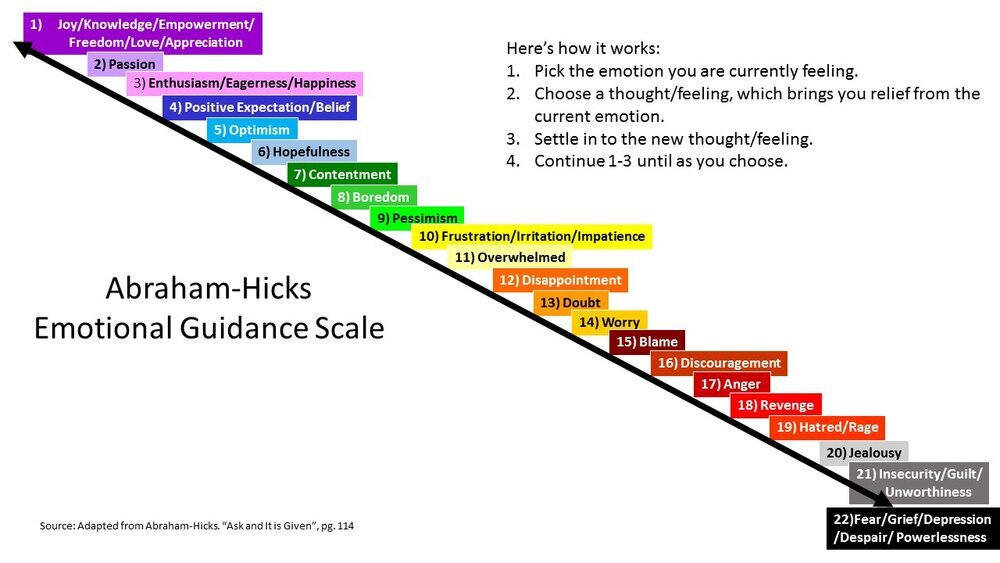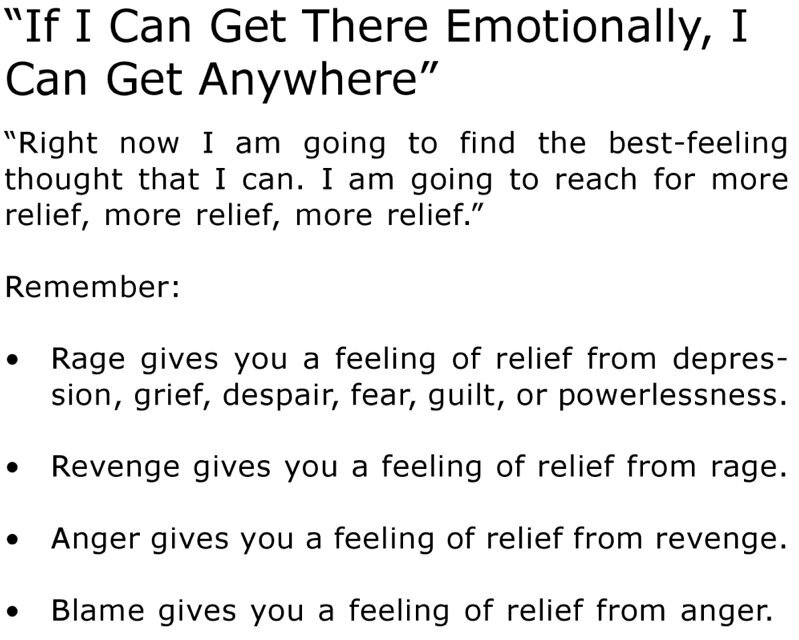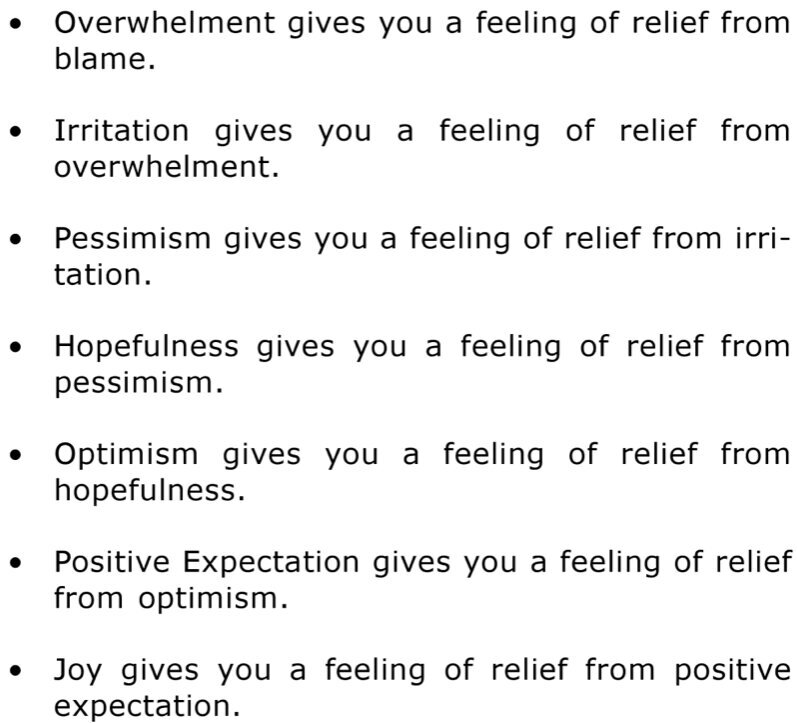- Articles
- Forum Archive
- Psychology, Psychiatry, Psychotherapy, and Health
- Therapy, Therapists, and Self-Help
You are using an out of date browser. It may not display this or other websites correctly.
You should upgrade or use an alternative browser.
You should upgrade or use an alternative browser.
- Thread starter Daniel E.
- Start date
More threads by Daniel E.
Bitterness shows you where you need to heal, where you’re still holding judgments on others and
yourself.
Resentment shows you where you’re living in the past and not allowing the present to be as it is.
Discomfort shows you that you need to pay attention right now to what is happening because you’re being given the opportunity to change, to do something different than you typically do it.
Anger shows you what you’re passionate about, where your boundaries are, and what you believe needs to change about the world.
Disappointment shows you that you tried for something, that you did not give in to apathy, that you still care.
Guilt shows you that you’re still living life in other people’s expectations of what you should do.
Shame shows you that you’re internalizing other people’s beliefs about who you should be (or who you are) and that you need to reconnect with yourself.
Anxiety shows you that you need to wake up, right now, and that you need to be present, that you’re stuck in the past and living in fear of the future.
Sadness shows you the depth of your feeling, the depth of your care for others and this world.

Just like a more diverse stock portfolio is more resilient to large swings in stock values, the more diverse your emotional life is, the more resilient you are to the large swings in experience that life gives you. If you’re comfortable with anger, you’ll be able to call it up at the appropriate moments and use it. If you’re comfortable with joy or guilt or grief, you’ll be able to use those when you need to as well.
A diverse emotional life isn’t just made up of a few “good” and “bad” emotions. You can also have lots of emotional subcategories, like amusement, joy, contentment, gratefulness, pride, love, hope, and anger, sadness, guilt, contempt, anxiety, disgust, embarrassment, and on and on. People with access to emotional diversity have a network of roads to get to where they need to go; people without it might only have one big highway of anger and a dirt road of sadness...
People who practice a wide range of emotions are self-aware enough to know what triggers these emotions and then act accordingly. Research has shown that self-awareness and the ability to self-label emotions has positive links to well-being4. This awareness and labelling makes people feel more in control of their lives, a huge factor in determining happiness and general well-being.
More variety in emotional experience also gives you a greater appreciation for just how transient emotions are. When you only allow yourself to feel one or two emotions all the time, you start to feel as though they are permanent (or should be permanent). The world always sucks. Life is always great. You always feel guilty because you’re a horrible person...
When you’re stuck in these one-emotion-defines-the-world mentalities, you forget that emotions are transient superficial things that don’t necessarily mean anything.
Emotional diversity shows us that emotions come and go. If you feel angry now, that’s fine, you won’t in a few hours. If you’re happy now, that’s great, enjoy it, because the next struggle is around the corner. If you feel guilty or sad, then that’s okay too, things will look up some time in the near future.
Hey, Listen to Your Emotions...
(source unknown)Bitterness shows you where you need to heal, where you’re still holding judgments on others and
yourself.
Resentment shows you where you’re living in the past and not allowing the present to be as it is.
Discomfort shows you that you need to pay attention right now to what is happening because you’re being given the opportunity to change, to do something different than you typically do it.
Anger shows you what you’re passionate about, where your boundaries are, and what you believe needs to change about the world.
Disappointment shows you that you tried for something, that you did not give in to apathy, that you still care.
Guilt shows you that you’re still living life in other people’s expectations of what you should do.
Shame shows you that you’re internalizing other people’s beliefs about who you should be (or who you are) and that you need to reconnect with yourself.
Anxiety shows you that you need to wake up, right now, and that you need to be present, that you’re stuck in the past and living in fear of the future.
Sadness shows you the depth of your feeling, the depth of your care for others and this world.

Happiness Is Not Enough
Constantly striving for happiness in the face of life's challenges can be just as bad as being miserable all the time.
markmanson.net
Just like a more diverse stock portfolio is more resilient to large swings in stock values, the more diverse your emotional life is, the more resilient you are to the large swings in experience that life gives you. If you’re comfortable with anger, you’ll be able to call it up at the appropriate moments and use it. If you’re comfortable with joy or guilt or grief, you’ll be able to use those when you need to as well.
A diverse emotional life isn’t just made up of a few “good” and “bad” emotions. You can also have lots of emotional subcategories, like amusement, joy, contentment, gratefulness, pride, love, hope, and anger, sadness, guilt, contempt, anxiety, disgust, embarrassment, and on and on. People with access to emotional diversity have a network of roads to get to where they need to go; people without it might only have one big highway of anger and a dirt road of sadness...
People who practice a wide range of emotions are self-aware enough to know what triggers these emotions and then act accordingly. Research has shown that self-awareness and the ability to self-label emotions has positive links to well-being4. This awareness and labelling makes people feel more in control of their lives, a huge factor in determining happiness and general well-being.
More variety in emotional experience also gives you a greater appreciation for just how transient emotions are. When you only allow yourself to feel one or two emotions all the time, you start to feel as though they are permanent (or should be permanent). The world always sucks. Life is always great. You always feel guilty because you’re a horrible person...
When you’re stuck in these one-emotion-defines-the-world mentalities, you forget that emotions are transient superficial things that don’t necessarily mean anything.
Emotional diversity shows us that emotions come and go. If you feel angry now, that’s fine, you won’t in a few hours. If you’re happy now, that’s great, enjoy it, because the next struggle is around the corner. If you feel guilty or sad, then that’s okay too, things will look up some time in the near future.
Replying is not possible. This forum is only available as an archive.
Similar threads
- Replies
- 3
- Views
- 3K
- Replies
- 0
- Views
- 5K
- Replies
- 1
- Views
- 1K
- Replies
- 0
- Views
- 1K



